The Interplay of CSR, Ethical Leadership, and Strategic Management
VerifiedAdded on 2022/09/12
|19
|5156
|13
Report
AI Summary
This report investigates the intricate relationship between Corporate Social Responsibility (CSR) and strategic leadership. It explores how CSR initiatives influence strategic direction, examining both the positive contributions and potential negative impacts on business operations. The report analyzes the significance of operational strategies for gaining competitive advantage and customer satisfaction, contrasting them with CSR practices. It further delves into the ethical dimensions of leadership, assessing how leaders navigate conflicts and make decisions. The study highlights the importance of ethical considerations in strategic management and provides insights into how companies can balance CSR with core business objectives. The report concludes by offering recommendations for integrating CSR into a company's strategic vision and improving the effectiveness of leadership practices in addressing organizational issues and achieving sustainable growth.
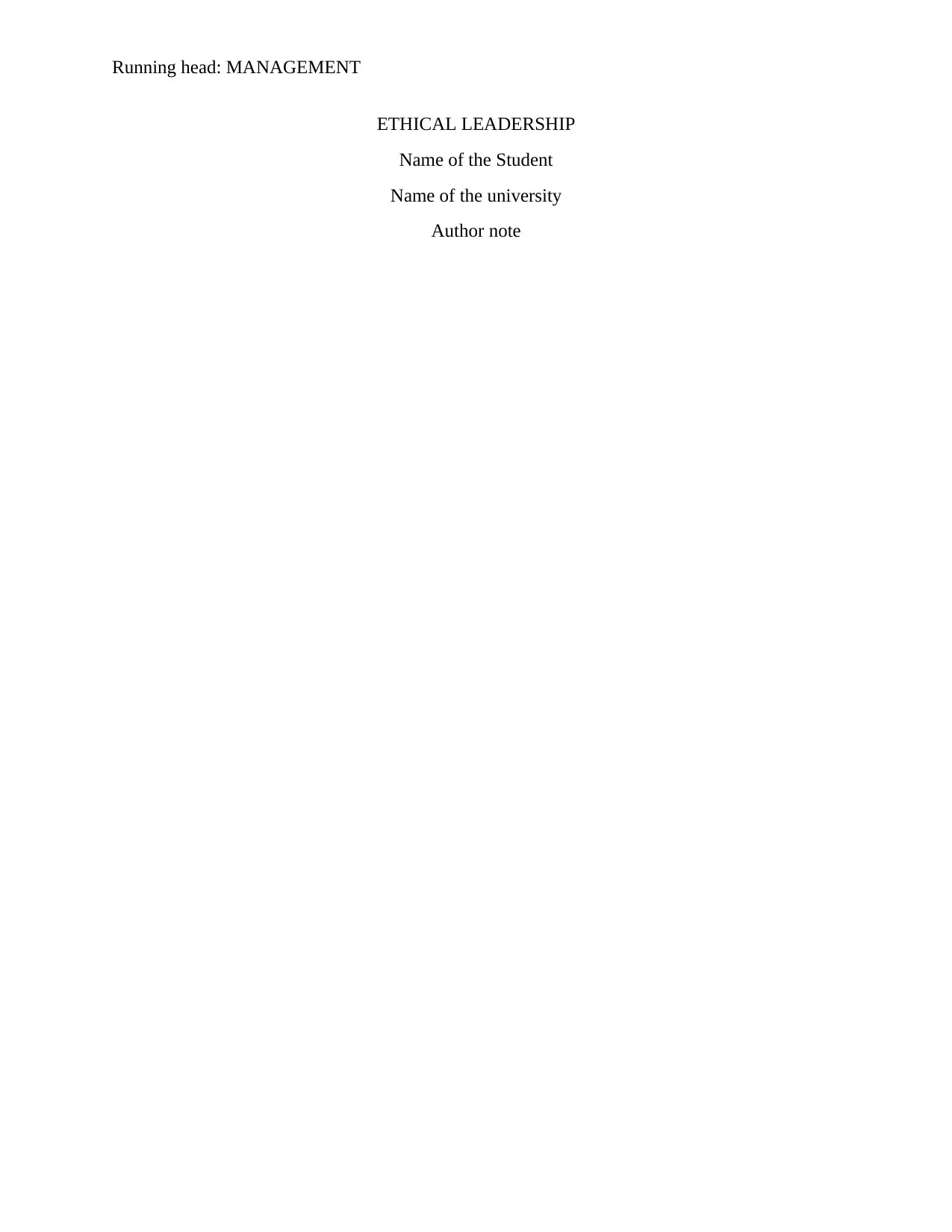
Running head: MANAGEMENT
ETHICAL LEADERSHIP
Name of the Student
Name of the university
Author note
ETHICAL LEADERSHIP
Name of the Student
Name of the university
Author note
Paraphrase This Document
Need a fresh take? Get an instant paraphrase of this document with our AI Paraphraser
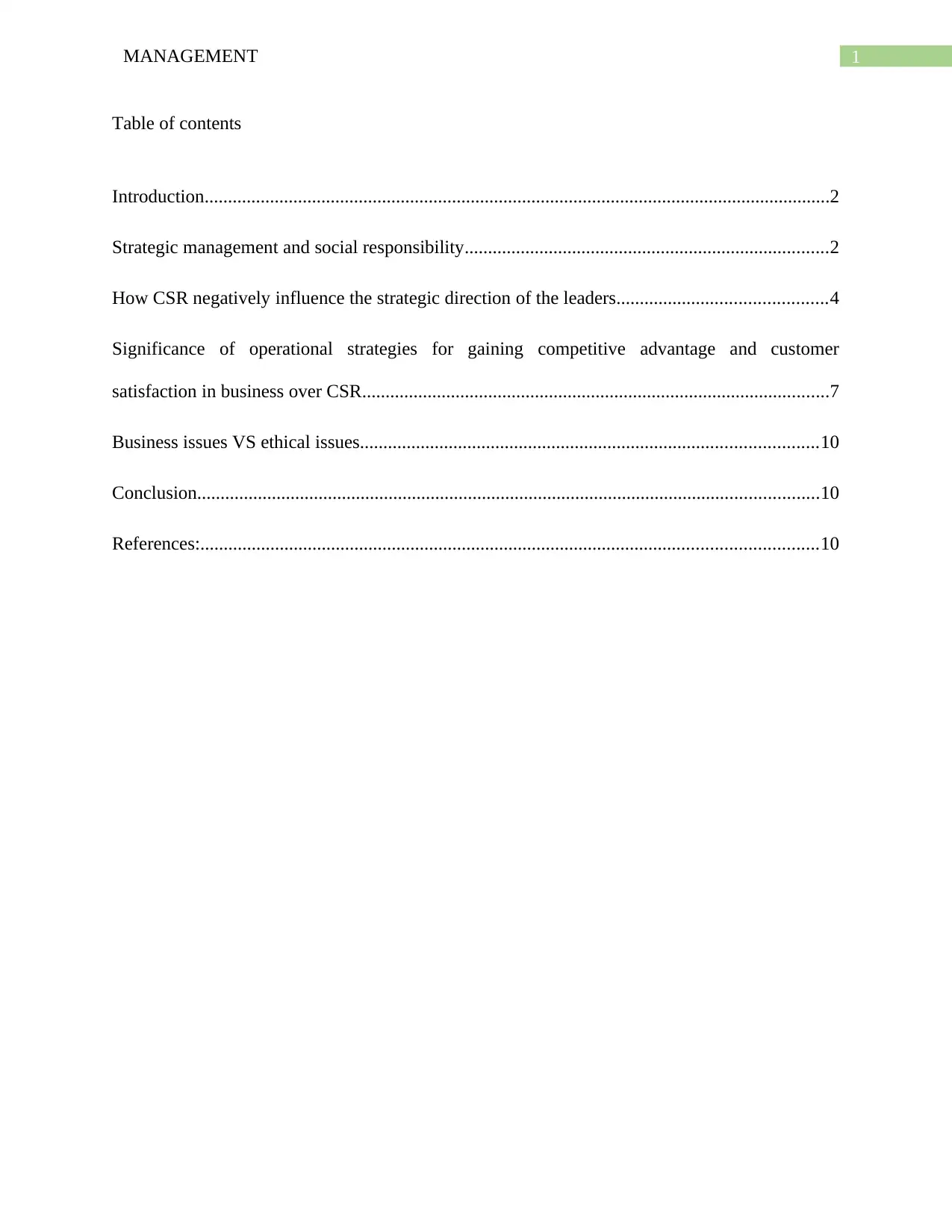
1MANAGEMENT
Table of contents
Introduction......................................................................................................................................2
Strategic management and social responsibility..............................................................................2
How CSR negatively influence the strategic direction of the leaders.............................................4
Significance of operational strategies for gaining competitive advantage and customer
satisfaction in business over CSR....................................................................................................7
Business issues VS ethical issues..................................................................................................10
Conclusion.....................................................................................................................................10
References:....................................................................................................................................10
Table of contents
Introduction......................................................................................................................................2
Strategic management and social responsibility..............................................................................2
How CSR negatively influence the strategic direction of the leaders.............................................4
Significance of operational strategies for gaining competitive advantage and customer
satisfaction in business over CSR....................................................................................................7
Business issues VS ethical issues..................................................................................................10
Conclusion.....................................................................................................................................10
References:....................................................................................................................................10
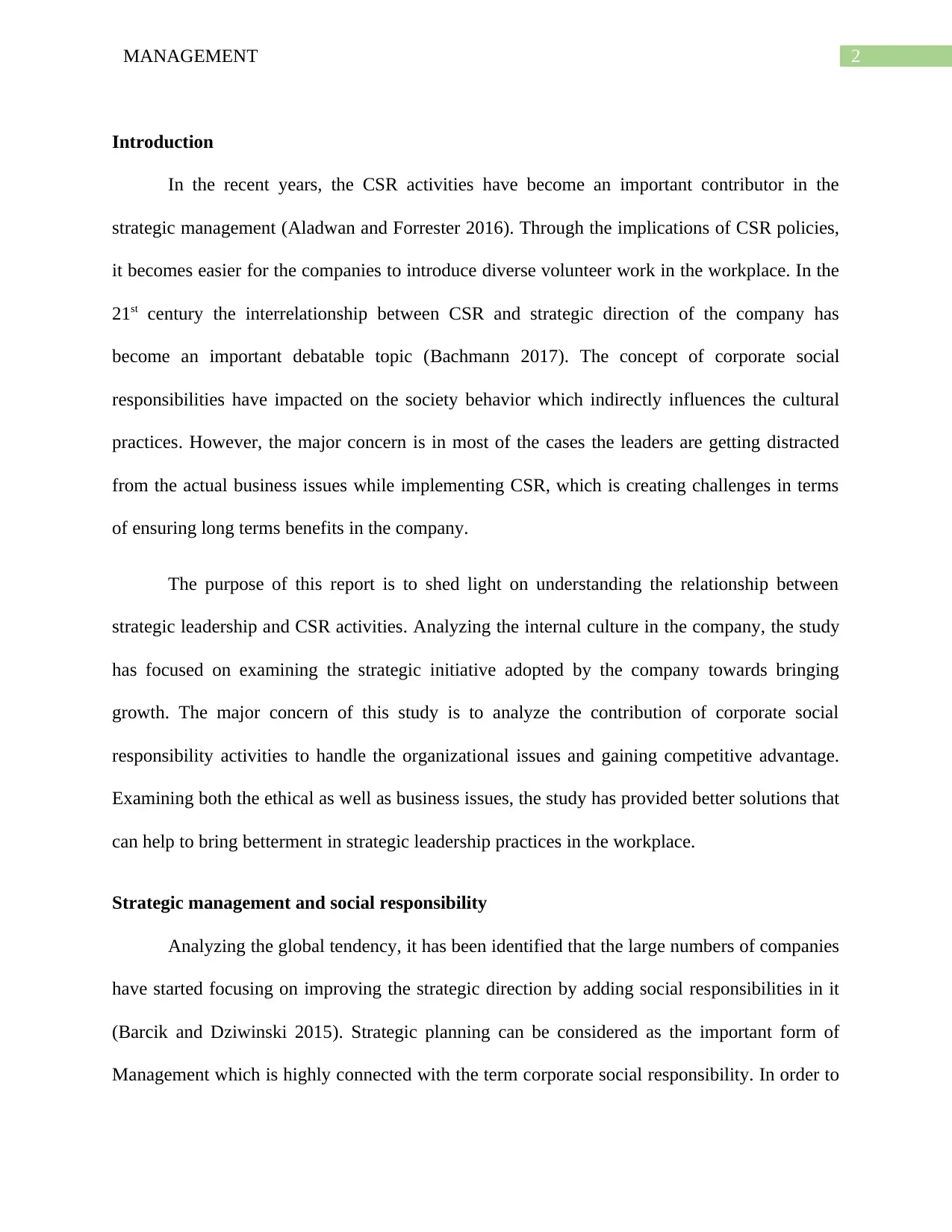
2MANAGEMENT
Introduction
In the recent years, the CSR activities have become an important contributor in the
strategic management (Aladwan and Forrester 2016). Through the implications of CSR policies,
it becomes easier for the companies to introduce diverse volunteer work in the workplace. In the
21st century the interrelationship between CSR and strategic direction of the company has
become an important debatable topic (Bachmann 2017). The concept of corporate social
responsibilities have impacted on the society behavior which indirectly influences the cultural
practices. However, the major concern is in most of the cases the leaders are getting distracted
from the actual business issues while implementing CSR, which is creating challenges in terms
of ensuring long terms benefits in the company.
The purpose of this report is to shed light on understanding the relationship between
strategic leadership and CSR activities. Analyzing the internal culture in the company, the study
has focused on examining the strategic initiative adopted by the company towards bringing
growth. The major concern of this study is to analyze the contribution of corporate social
responsibility activities to handle the organizational issues and gaining competitive advantage.
Examining both the ethical as well as business issues, the study has provided better solutions that
can help to bring betterment in strategic leadership practices in the workplace.
Strategic management and social responsibility
Analyzing the global tendency, it has been identified that the large numbers of companies
have started focusing on improving the strategic direction by adding social responsibilities in it
(Barcik and Dziwinski 2015). Strategic planning can be considered as the important form of
Management which is highly connected with the term corporate social responsibility. In order to
Introduction
In the recent years, the CSR activities have become an important contributor in the
strategic management (Aladwan and Forrester 2016). Through the implications of CSR policies,
it becomes easier for the companies to introduce diverse volunteer work in the workplace. In the
21st century the interrelationship between CSR and strategic direction of the company has
become an important debatable topic (Bachmann 2017). The concept of corporate social
responsibilities have impacted on the society behavior which indirectly influences the cultural
practices. However, the major concern is in most of the cases the leaders are getting distracted
from the actual business issues while implementing CSR, which is creating challenges in terms
of ensuring long terms benefits in the company.
The purpose of this report is to shed light on understanding the relationship between
strategic leadership and CSR activities. Analyzing the internal culture in the company, the study
has focused on examining the strategic initiative adopted by the company towards bringing
growth. The major concern of this study is to analyze the contribution of corporate social
responsibility activities to handle the organizational issues and gaining competitive advantage.
Examining both the ethical as well as business issues, the study has provided better solutions that
can help to bring betterment in strategic leadership practices in the workplace.
Strategic management and social responsibility
Analyzing the global tendency, it has been identified that the large numbers of companies
have started focusing on improving the strategic direction by adding social responsibilities in it
(Barcik and Dziwinski 2015). Strategic planning can be considered as the important form of
Management which is highly connected with the term corporate social responsibility. In order to
⊘ This is a preview!⊘
Do you want full access?
Subscribe today to unlock all pages.

Trusted by 1+ million students worldwide
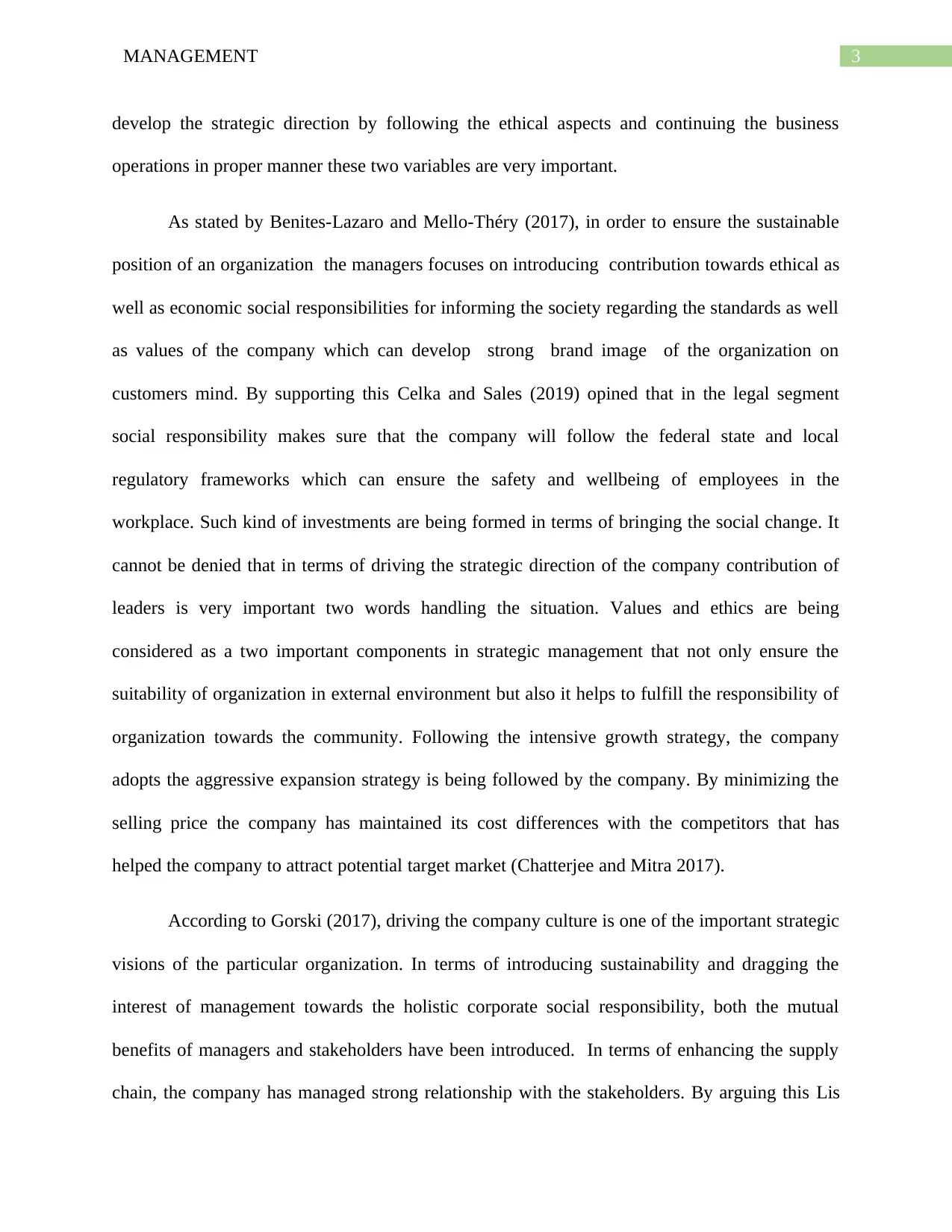
3MANAGEMENT
develop the strategic direction by following the ethical aspects and continuing the business
operations in proper manner these two variables are very important.
As stated by Benites-Lazaro and Mello-Théry (2017), in order to ensure the sustainable
position of an organization the managers focuses on introducing contribution towards ethical as
well as economic social responsibilities for informing the society regarding the standards as well
as values of the company which can develop strong brand image of the organization on
customers mind. By supporting this Celka and Sales (2019) opined that in the legal segment
social responsibility makes sure that the company will follow the federal state and local
regulatory frameworks which can ensure the safety and wellbeing of employees in the
workplace. Such kind of investments are being formed in terms of bringing the social change. It
cannot be denied that in terms of driving the strategic direction of the company contribution of
leaders is very important two words handling the situation. Values and ethics are being
considered as a two important components in strategic management that not only ensure the
suitability of organization in external environment but also it helps to fulfill the responsibility of
organization towards the community. Following the intensive growth strategy, the company
adopts the aggressive expansion strategy is being followed by the company. By minimizing the
selling price the company has maintained its cost differences with the competitors that has
helped the company to attract potential target market (Chatterjee and Mitra 2017).
According to Gorski (2017), driving the company culture is one of the important strategic
visions of the particular organization. In terms of introducing sustainability and dragging the
interest of management towards the holistic corporate social responsibility, both the mutual
benefits of managers and stakeholders have been introduced. In terms of enhancing the supply
chain, the company has managed strong relationship with the stakeholders. By arguing this Lis
develop the strategic direction by following the ethical aspects and continuing the business
operations in proper manner these two variables are very important.
As stated by Benites-Lazaro and Mello-Théry (2017), in order to ensure the sustainable
position of an organization the managers focuses on introducing contribution towards ethical as
well as economic social responsibilities for informing the society regarding the standards as well
as values of the company which can develop strong brand image of the organization on
customers mind. By supporting this Celka and Sales (2019) opined that in the legal segment
social responsibility makes sure that the company will follow the federal state and local
regulatory frameworks which can ensure the safety and wellbeing of employees in the
workplace. Such kind of investments are being formed in terms of bringing the social change. It
cannot be denied that in terms of driving the strategic direction of the company contribution of
leaders is very important two words handling the situation. Values and ethics are being
considered as a two important components in strategic management that not only ensure the
suitability of organization in external environment but also it helps to fulfill the responsibility of
organization towards the community. Following the intensive growth strategy, the company
adopts the aggressive expansion strategy is being followed by the company. By minimizing the
selling price the company has maintained its cost differences with the competitors that has
helped the company to attract potential target market (Chatterjee and Mitra 2017).
According to Gorski (2017), driving the company culture is one of the important strategic
visions of the particular organization. In terms of introducing sustainability and dragging the
interest of management towards the holistic corporate social responsibility, both the mutual
benefits of managers and stakeholders have been introduced. In terms of enhancing the supply
chain, the company has managed strong relationship with the stakeholders. By arguing this Lis
Paraphrase This Document
Need a fresh take? Get an instant paraphrase of this document with our AI Paraphraser
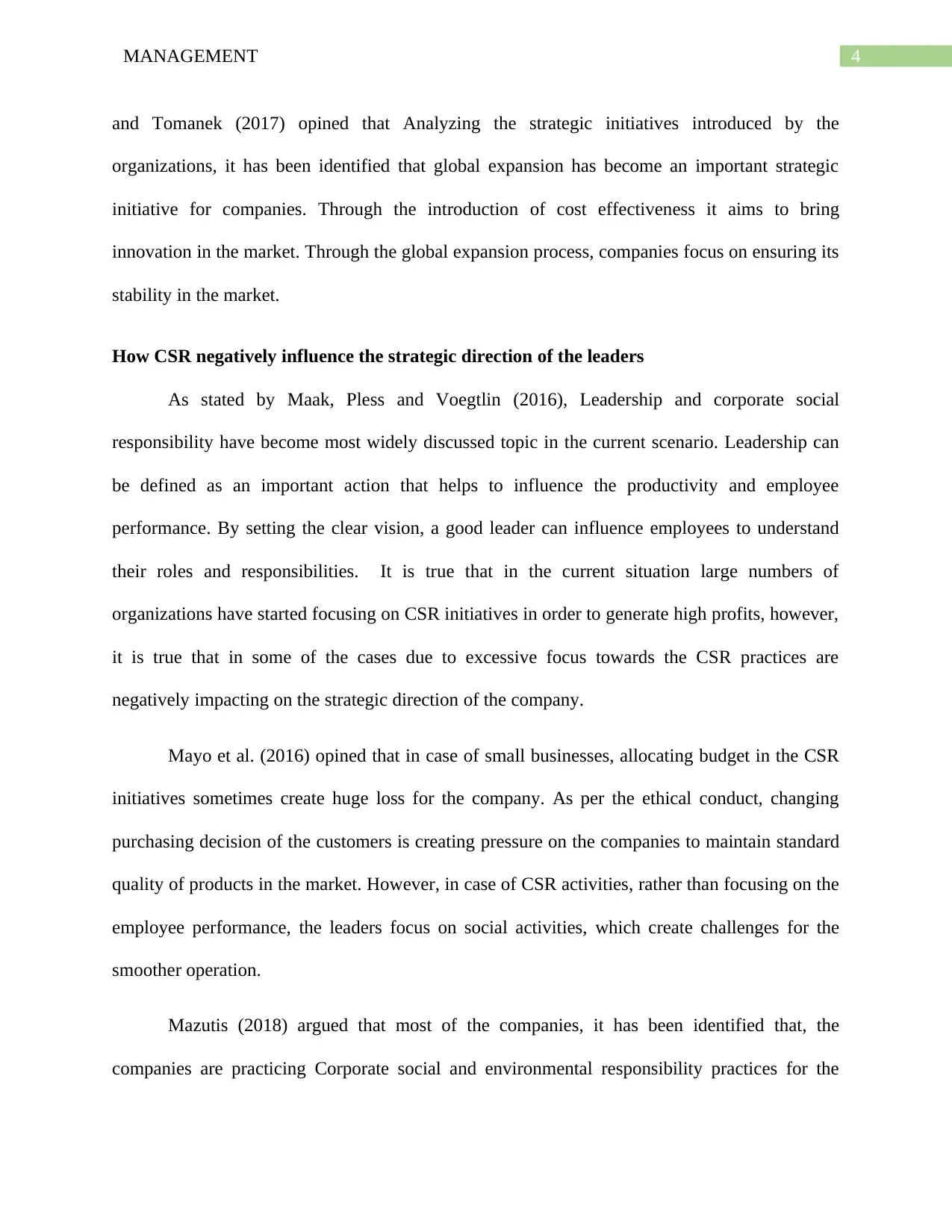
4MANAGEMENT
and Tomanek (2017) opined that Analyzing the strategic initiatives introduced by the
organizations, it has been identified that global expansion has become an important strategic
initiative for companies. Through the introduction of cost effectiveness it aims to bring
innovation in the market. Through the global expansion process, companies focus on ensuring its
stability in the market.
How CSR negatively influence the strategic direction of the leaders
As stated by Maak, Pless and Voegtlin (2016), Leadership and corporate social
responsibility have become most widely discussed topic in the current scenario. Leadership can
be defined as an important action that helps to influence the productivity and employee
performance. By setting the clear vision, a good leader can influence employees to understand
their roles and responsibilities. It is true that in the current situation large numbers of
organizations have started focusing on CSR initiatives in order to generate high profits, however,
it is true that in some of the cases due to excessive focus towards the CSR practices are
negatively impacting on the strategic direction of the company.
Mayo et al. (2016) opined that in case of small businesses, allocating budget in the CSR
initiatives sometimes create huge loss for the company. As per the ethical conduct, changing
purchasing decision of the customers is creating pressure on the companies to maintain standard
quality of products in the market. However, in case of CSR activities, rather than focusing on the
employee performance, the leaders focus on social activities, which create challenges for the
smoother operation.
Mazutis (2018) argued that most of the companies, it has been identified that, the
companies are practicing Corporate social and environmental responsibility practices for the
and Tomanek (2017) opined that Analyzing the strategic initiatives introduced by the
organizations, it has been identified that global expansion has become an important strategic
initiative for companies. Through the introduction of cost effectiveness it aims to bring
innovation in the market. Through the global expansion process, companies focus on ensuring its
stability in the market.
How CSR negatively influence the strategic direction of the leaders
As stated by Maak, Pless and Voegtlin (2016), Leadership and corporate social
responsibility have become most widely discussed topic in the current scenario. Leadership can
be defined as an important action that helps to influence the productivity and employee
performance. By setting the clear vision, a good leader can influence employees to understand
their roles and responsibilities. It is true that in the current situation large numbers of
organizations have started focusing on CSR initiatives in order to generate high profits, however,
it is true that in some of the cases due to excessive focus towards the CSR practices are
negatively impacting on the strategic direction of the company.
Mayo et al. (2016) opined that in case of small businesses, allocating budget in the CSR
initiatives sometimes create huge loss for the company. As per the ethical conduct, changing
purchasing decision of the customers is creating pressure on the companies to maintain standard
quality of products in the market. However, in case of CSR activities, rather than focusing on the
employee performance, the leaders focus on social activities, which create challenges for the
smoother operation.
Mazutis (2018) argued that most of the companies, it has been identified that, the
companies are practicing Corporate social and environmental responsibility practices for the
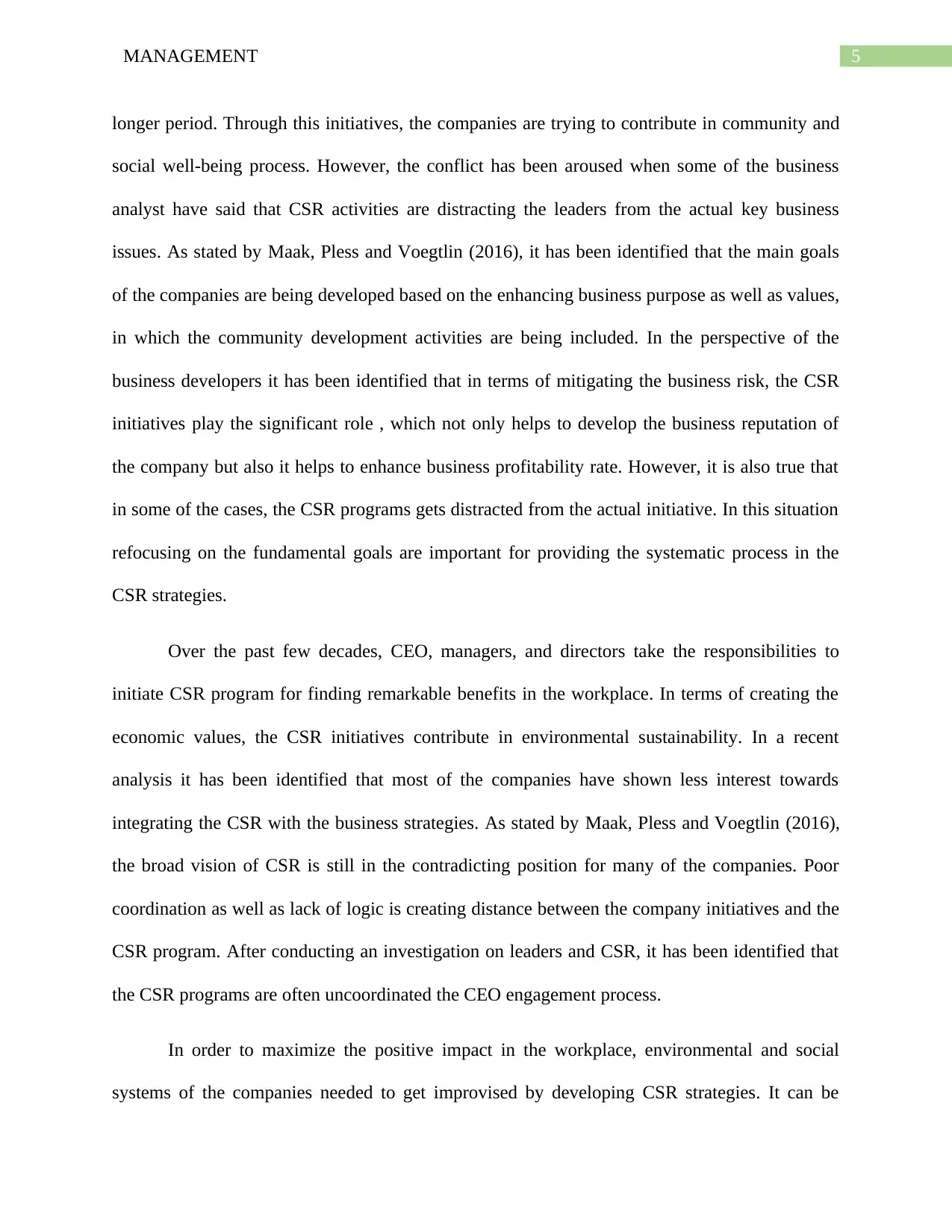
5MANAGEMENT
longer period. Through this initiatives, the companies are trying to contribute in community and
social well-being process. However, the conflict has been aroused when some of the business
analyst have said that CSR activities are distracting the leaders from the actual key business
issues. As stated by Maak, Pless and Voegtlin (2016), it has been identified that the main goals
of the companies are being developed based on the enhancing business purpose as well as values,
in which the community development activities are being included. In the perspective of the
business developers it has been identified that in terms of mitigating the business risk, the CSR
initiatives play the significant role , which not only helps to develop the business reputation of
the company but also it helps to enhance business profitability rate. However, it is also true that
in some of the cases, the CSR programs gets distracted from the actual initiative. In this situation
refocusing on the fundamental goals are important for providing the systematic process in the
CSR strategies.
Over the past few decades, CEO, managers, and directors take the responsibilities to
initiate CSR program for finding remarkable benefits in the workplace. In terms of creating the
economic values, the CSR initiatives contribute in environmental sustainability. In a recent
analysis it has been identified that most of the companies have shown less interest towards
integrating the CSR with the business strategies. As stated by Maak, Pless and Voegtlin (2016),
the broad vision of CSR is still in the contradicting position for many of the companies. Poor
coordination as well as lack of logic is creating distance between the company initiatives and the
CSR program. After conducting an investigation on leaders and CSR, it has been identified that
the CSR programs are often uncoordinated the CEO engagement process.
In order to maximize the positive impact in the workplace, environmental and social
systems of the companies needed to get improvised by developing CSR strategies. It can be
longer period. Through this initiatives, the companies are trying to contribute in community and
social well-being process. However, the conflict has been aroused when some of the business
analyst have said that CSR activities are distracting the leaders from the actual key business
issues. As stated by Maak, Pless and Voegtlin (2016), it has been identified that the main goals
of the companies are being developed based on the enhancing business purpose as well as values,
in which the community development activities are being included. In the perspective of the
business developers it has been identified that in terms of mitigating the business risk, the CSR
initiatives play the significant role , which not only helps to develop the business reputation of
the company but also it helps to enhance business profitability rate. However, it is also true that
in some of the cases, the CSR programs gets distracted from the actual initiative. In this situation
refocusing on the fundamental goals are important for providing the systematic process in the
CSR strategies.
Over the past few decades, CEO, managers, and directors take the responsibilities to
initiate CSR program for finding remarkable benefits in the workplace. In terms of creating the
economic values, the CSR initiatives contribute in environmental sustainability. In a recent
analysis it has been identified that most of the companies have shown less interest towards
integrating the CSR with the business strategies. As stated by Maak, Pless and Voegtlin (2016),
the broad vision of CSR is still in the contradicting position for many of the companies. Poor
coordination as well as lack of logic is creating distance between the company initiatives and the
CSR program. After conducting an investigation on leaders and CSR, it has been identified that
the CSR programs are often uncoordinated the CEO engagement process.
In order to maximize the positive impact in the workplace, environmental and social
systems of the companies needed to get improvised by developing CSR strategies. It can be
⊘ This is a preview!⊘
Do you want full access?
Subscribe today to unlock all pages.

Trusted by 1+ million students worldwide
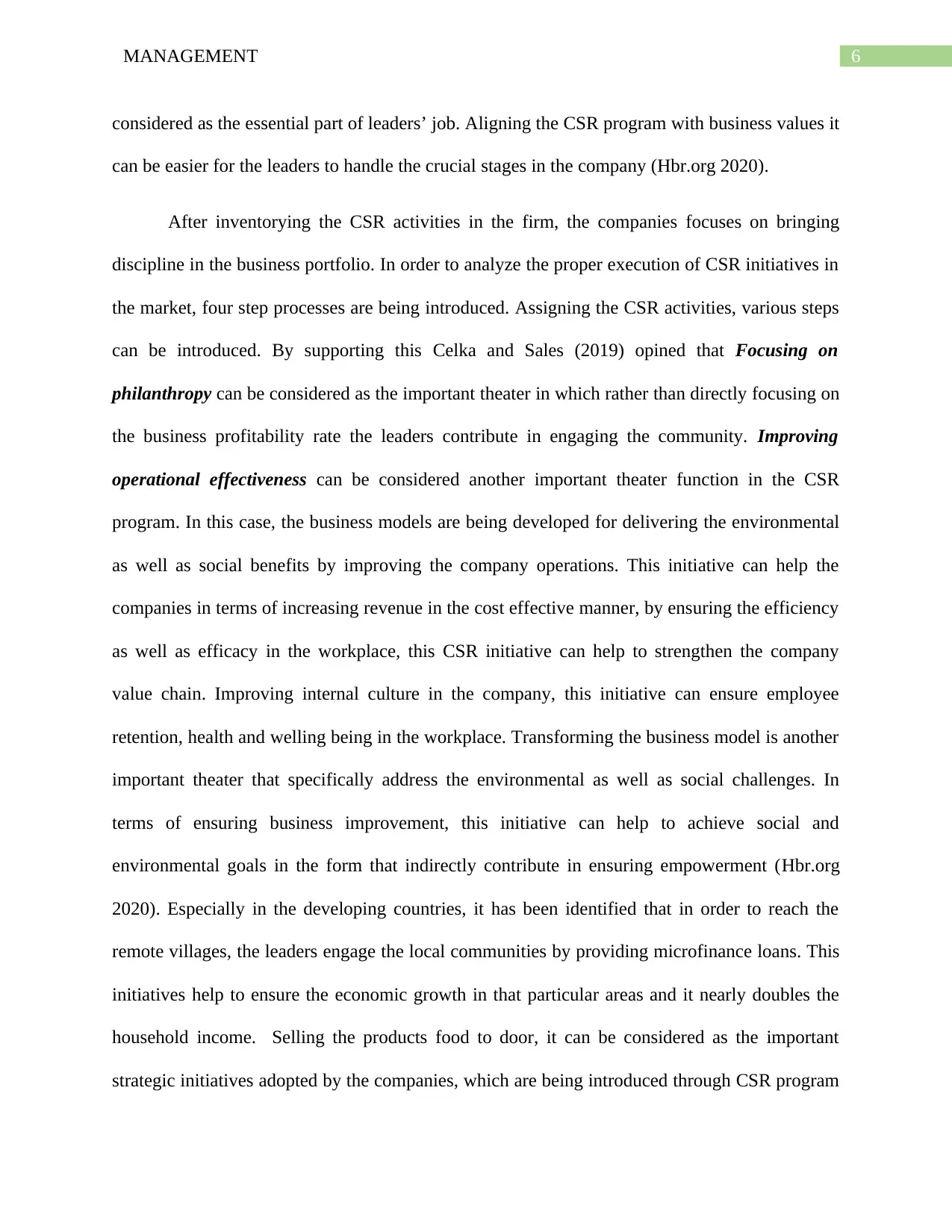
6MANAGEMENT
considered as the essential part of leaders’ job. Aligning the CSR program with business values it
can be easier for the leaders to handle the crucial stages in the company (Hbr.org 2020).
After inventorying the CSR activities in the firm, the companies focuses on bringing
discipline in the business portfolio. In order to analyze the proper execution of CSR initiatives in
the market, four step processes are being introduced. Assigning the CSR activities, various steps
can be introduced. By supporting this Celka and Sales (2019) opined that Focusing on
philanthropy can be considered as the important theater in which rather than directly focusing on
the business profitability rate the leaders contribute in engaging the community. Improving
operational effectiveness can be considered another important theater function in the CSR
program. In this case, the business models are being developed for delivering the environmental
as well as social benefits by improving the company operations. This initiative can help the
companies in terms of increasing revenue in the cost effective manner, by ensuring the efficiency
as well as efficacy in the workplace, this CSR initiative can help to strengthen the company
value chain. Improving internal culture in the company, this initiative can ensure employee
retention, health and welling being in the workplace. Transforming the business model is another
important theater that specifically address the environmental as well as social challenges. In
terms of ensuring business improvement, this initiative can help to achieve social and
environmental goals in the form that indirectly contribute in ensuring empowerment (Hbr.org
2020). Especially in the developing countries, it has been identified that in order to reach the
remote villages, the leaders engage the local communities by providing microfinance loans. This
initiatives help to ensure the economic growth in that particular areas and it nearly doubles the
household income. Selling the products food to door, it can be considered as the important
strategic initiatives adopted by the companies, which are being introduced through CSR program
considered as the essential part of leaders’ job. Aligning the CSR program with business values it
can be easier for the leaders to handle the crucial stages in the company (Hbr.org 2020).
After inventorying the CSR activities in the firm, the companies focuses on bringing
discipline in the business portfolio. In order to analyze the proper execution of CSR initiatives in
the market, four step processes are being introduced. Assigning the CSR activities, various steps
can be introduced. By supporting this Celka and Sales (2019) opined that Focusing on
philanthropy can be considered as the important theater in which rather than directly focusing on
the business profitability rate the leaders contribute in engaging the community. Improving
operational effectiveness can be considered another important theater function in the CSR
program. In this case, the business models are being developed for delivering the environmental
as well as social benefits by improving the company operations. This initiative can help the
companies in terms of increasing revenue in the cost effective manner, by ensuring the efficiency
as well as efficacy in the workplace, this CSR initiative can help to strengthen the company
value chain. Improving internal culture in the company, this initiative can ensure employee
retention, health and welling being in the workplace. Transforming the business model is another
important theater that specifically address the environmental as well as social challenges. In
terms of ensuring business improvement, this initiative can help to achieve social and
environmental goals in the form that indirectly contribute in ensuring empowerment (Hbr.org
2020). Especially in the developing countries, it has been identified that in order to reach the
remote villages, the leaders engage the local communities by providing microfinance loans. This
initiatives help to ensure the economic growth in that particular areas and it nearly doubles the
household income. Selling the products food to door, it can be considered as the important
strategic initiatives adopted by the companies, which are being introduced through CSR program
Paraphrase This Document
Need a fresh take? Get an instant paraphrase of this document with our AI Paraphraser
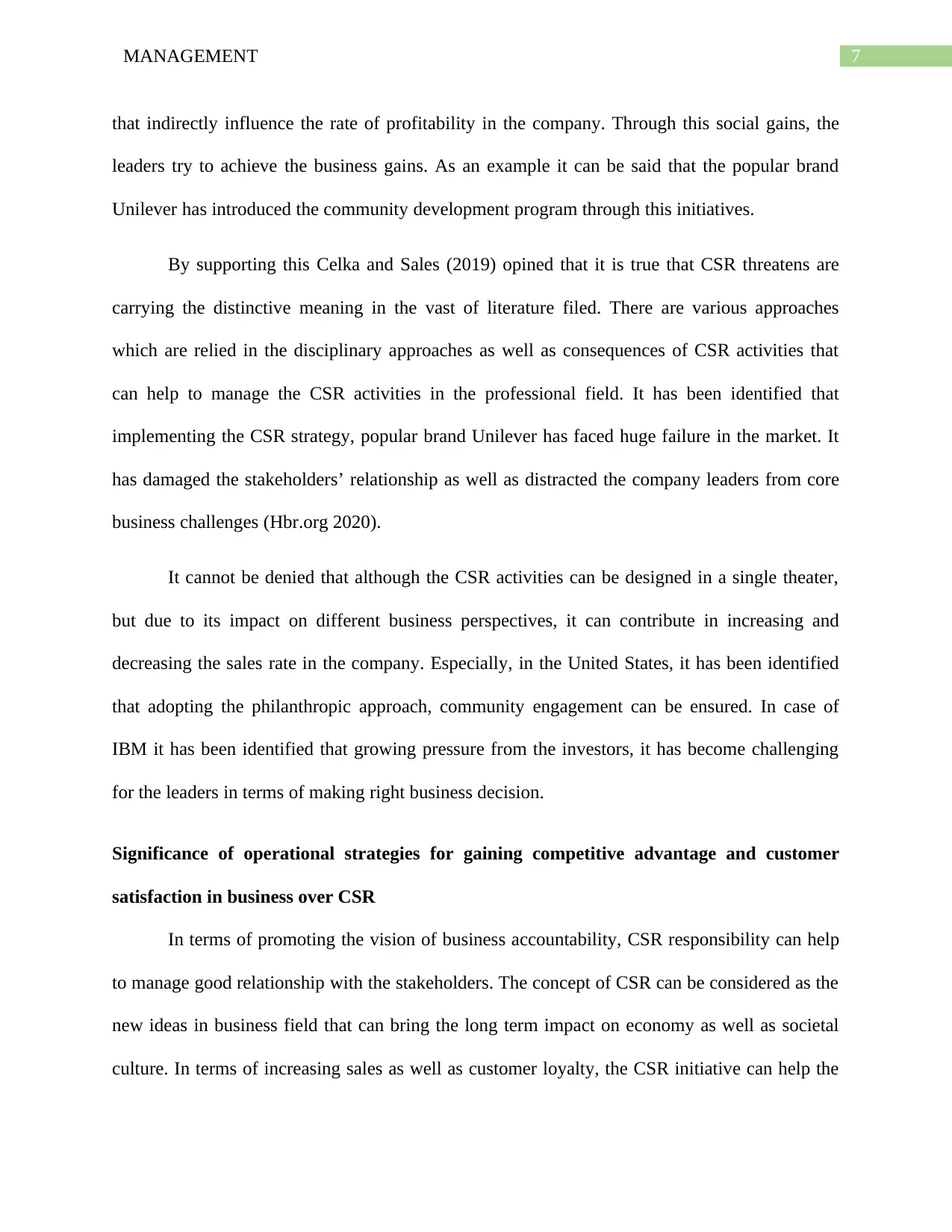
7MANAGEMENT
that indirectly influence the rate of profitability in the company. Through this social gains, the
leaders try to achieve the business gains. As an example it can be said that the popular brand
Unilever has introduced the community development program through this initiatives.
By supporting this Celka and Sales (2019) opined that it is true that CSR threatens are
carrying the distinctive meaning in the vast of literature filed. There are various approaches
which are relied in the disciplinary approaches as well as consequences of CSR activities that
can help to manage the CSR activities in the professional field. It has been identified that
implementing the CSR strategy, popular brand Unilever has faced huge failure in the market. It
has damaged the stakeholders’ relationship as well as distracted the company leaders from core
business challenges (Hbr.org 2020).
It cannot be denied that although the CSR activities can be designed in a single theater,
but due to its impact on different business perspectives, it can contribute in increasing and
decreasing the sales rate in the company. Especially, in the United States, it has been identified
that adopting the philanthropic approach, community engagement can be ensured. In case of
IBM it has been identified that growing pressure from the investors, it has become challenging
for the leaders in terms of making right business decision.
Significance of operational strategies for gaining competitive advantage and customer
satisfaction in business over CSR
In terms of promoting the vision of business accountability, CSR responsibility can help
to manage good relationship with the stakeholders. The concept of CSR can be considered as the
new ideas in business field that can bring the long term impact on economy as well as societal
culture. In terms of increasing sales as well as customer loyalty, the CSR initiative can help the
that indirectly influence the rate of profitability in the company. Through this social gains, the
leaders try to achieve the business gains. As an example it can be said that the popular brand
Unilever has introduced the community development program through this initiatives.
By supporting this Celka and Sales (2019) opined that it is true that CSR threatens are
carrying the distinctive meaning in the vast of literature filed. There are various approaches
which are relied in the disciplinary approaches as well as consequences of CSR activities that
can help to manage the CSR activities in the professional field. It has been identified that
implementing the CSR strategy, popular brand Unilever has faced huge failure in the market. It
has damaged the stakeholders’ relationship as well as distracted the company leaders from core
business challenges (Hbr.org 2020).
It cannot be denied that although the CSR activities can be designed in a single theater,
but due to its impact on different business perspectives, it can contribute in increasing and
decreasing the sales rate in the company. Especially, in the United States, it has been identified
that adopting the philanthropic approach, community engagement can be ensured. In case of
IBM it has been identified that growing pressure from the investors, it has become challenging
for the leaders in terms of making right business decision.
Significance of operational strategies for gaining competitive advantage and customer
satisfaction in business over CSR
In terms of promoting the vision of business accountability, CSR responsibility can help
to manage good relationship with the stakeholders. The concept of CSR can be considered as the
new ideas in business field that can bring the long term impact on economy as well as societal
culture. In terms of increasing sales as well as customer loyalty, the CSR initiative can help the
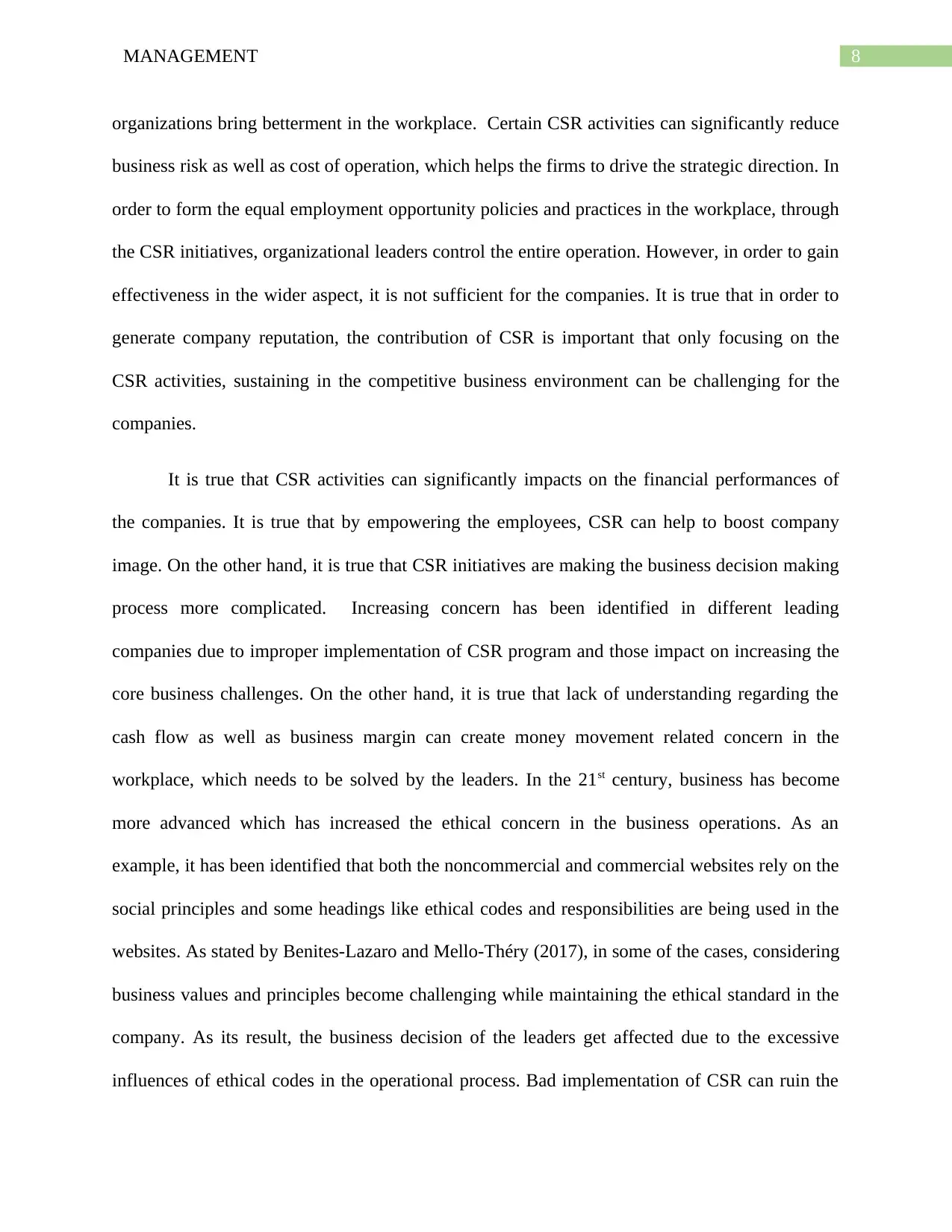
8MANAGEMENT
organizations bring betterment in the workplace. Certain CSR activities can significantly reduce
business risk as well as cost of operation, which helps the firms to drive the strategic direction. In
order to form the equal employment opportunity policies and practices in the workplace, through
the CSR initiatives, organizational leaders control the entire operation. However, in order to gain
effectiveness in the wider aspect, it is not sufficient for the companies. It is true that in order to
generate company reputation, the contribution of CSR is important that only focusing on the
CSR activities, sustaining in the competitive business environment can be challenging for the
companies.
It is true that CSR activities can significantly impacts on the financial performances of
the companies. It is true that by empowering the employees, CSR can help to boost company
image. On the other hand, it is true that CSR initiatives are making the business decision making
process more complicated. Increasing concern has been identified in different leading
companies due to improper implementation of CSR program and those impact on increasing the
core business challenges. On the other hand, it is true that lack of understanding regarding the
cash flow as well as business margin can create money movement related concern in the
workplace, which needs to be solved by the leaders. In the 21st century, business has become
more advanced which has increased the ethical concern in the business operations. As an
example, it has been identified that both the noncommercial and commercial websites rely on the
social principles and some headings like ethical codes and responsibilities are being used in the
websites. As stated by Benites-Lazaro and Mello-Théry (2017), in some of the cases, considering
business values and principles become challenging while maintaining the ethical standard in the
company. As its result, the business decision of the leaders get affected due to the excessive
influences of ethical codes in the operational process. Bad implementation of CSR can ruin the
organizations bring betterment in the workplace. Certain CSR activities can significantly reduce
business risk as well as cost of operation, which helps the firms to drive the strategic direction. In
order to form the equal employment opportunity policies and practices in the workplace, through
the CSR initiatives, organizational leaders control the entire operation. However, in order to gain
effectiveness in the wider aspect, it is not sufficient for the companies. It is true that in order to
generate company reputation, the contribution of CSR is important that only focusing on the
CSR activities, sustaining in the competitive business environment can be challenging for the
companies.
It is true that CSR activities can significantly impacts on the financial performances of
the companies. It is true that by empowering the employees, CSR can help to boost company
image. On the other hand, it is true that CSR initiatives are making the business decision making
process more complicated. Increasing concern has been identified in different leading
companies due to improper implementation of CSR program and those impact on increasing the
core business challenges. On the other hand, it is true that lack of understanding regarding the
cash flow as well as business margin can create money movement related concern in the
workplace, which needs to be solved by the leaders. In the 21st century, business has become
more advanced which has increased the ethical concern in the business operations. As an
example, it has been identified that both the noncommercial and commercial websites rely on the
social principles and some headings like ethical codes and responsibilities are being used in the
websites. As stated by Benites-Lazaro and Mello-Théry (2017), in some of the cases, considering
business values and principles become challenging while maintaining the ethical standard in the
company. As its result, the business decision of the leaders get affected due to the excessive
influences of ethical codes in the operational process. Bad implementation of CSR can ruin the
⊘ This is a preview!⊘
Do you want full access?
Subscribe today to unlock all pages.

Trusted by 1+ million students worldwide
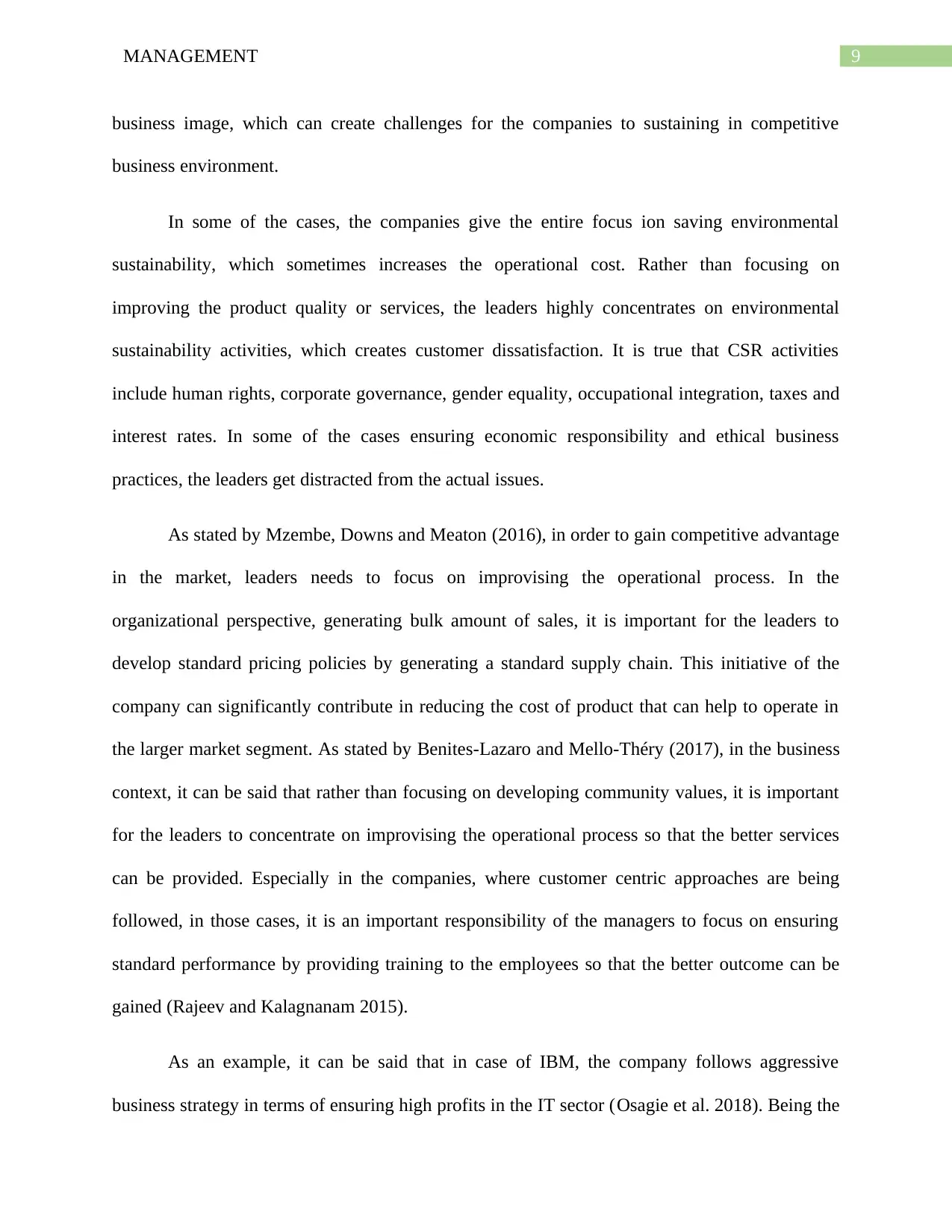
9MANAGEMENT
business image, which can create challenges for the companies to sustaining in competitive
business environment.
In some of the cases, the companies give the entire focus ion saving environmental
sustainability, which sometimes increases the operational cost. Rather than focusing on
improving the product quality or services, the leaders highly concentrates on environmental
sustainability activities, which creates customer dissatisfaction. It is true that CSR activities
include human rights, corporate governance, gender equality, occupational integration, taxes and
interest rates. In some of the cases ensuring economic responsibility and ethical business
practices, the leaders get distracted from the actual issues.
As stated by Mzembe, Downs and Meaton (2016), in order to gain competitive advantage
in the market, leaders needs to focus on improvising the operational process. In the
organizational perspective, generating bulk amount of sales, it is important for the leaders to
develop standard pricing policies by generating a standard supply chain. This initiative of the
company can significantly contribute in reducing the cost of product that can help to operate in
the larger market segment. As stated by Benites-Lazaro and Mello-Théry (2017), in the business
context, it can be said that rather than focusing on developing community values, it is important
for the leaders to concentrate on improvising the operational process so that the better services
can be provided. Especially in the companies, where customer centric approaches are being
followed, in those cases, it is an important responsibility of the managers to focus on ensuring
standard performance by providing training to the employees so that the better outcome can be
gained (Rajeev and Kalagnanam 2015).
As an example, it can be said that in case of IBM, the company follows aggressive
business strategy in terms of ensuring high profits in the IT sector (Osagie et al. 2018). Being the
business image, which can create challenges for the companies to sustaining in competitive
business environment.
In some of the cases, the companies give the entire focus ion saving environmental
sustainability, which sometimes increases the operational cost. Rather than focusing on
improving the product quality or services, the leaders highly concentrates on environmental
sustainability activities, which creates customer dissatisfaction. It is true that CSR activities
include human rights, corporate governance, gender equality, occupational integration, taxes and
interest rates. In some of the cases ensuring economic responsibility and ethical business
practices, the leaders get distracted from the actual issues.
As stated by Mzembe, Downs and Meaton (2016), in order to gain competitive advantage
in the market, leaders needs to focus on improvising the operational process. In the
organizational perspective, generating bulk amount of sales, it is important for the leaders to
develop standard pricing policies by generating a standard supply chain. This initiative of the
company can significantly contribute in reducing the cost of product that can help to operate in
the larger market segment. As stated by Benites-Lazaro and Mello-Théry (2017), in the business
context, it can be said that rather than focusing on developing community values, it is important
for the leaders to concentrate on improvising the operational process so that the better services
can be provided. Especially in the companies, where customer centric approaches are being
followed, in those cases, it is an important responsibility of the managers to focus on ensuring
standard performance by providing training to the employees so that the better outcome can be
gained (Rajeev and Kalagnanam 2015).
As an example, it can be said that in case of IBM, the company follows aggressive
business strategy in terms of ensuring high profits in the IT sector (Osagie et al. 2018). Being the
Paraphrase This Document
Need a fresh take? Get an instant paraphrase of this document with our AI Paraphraser
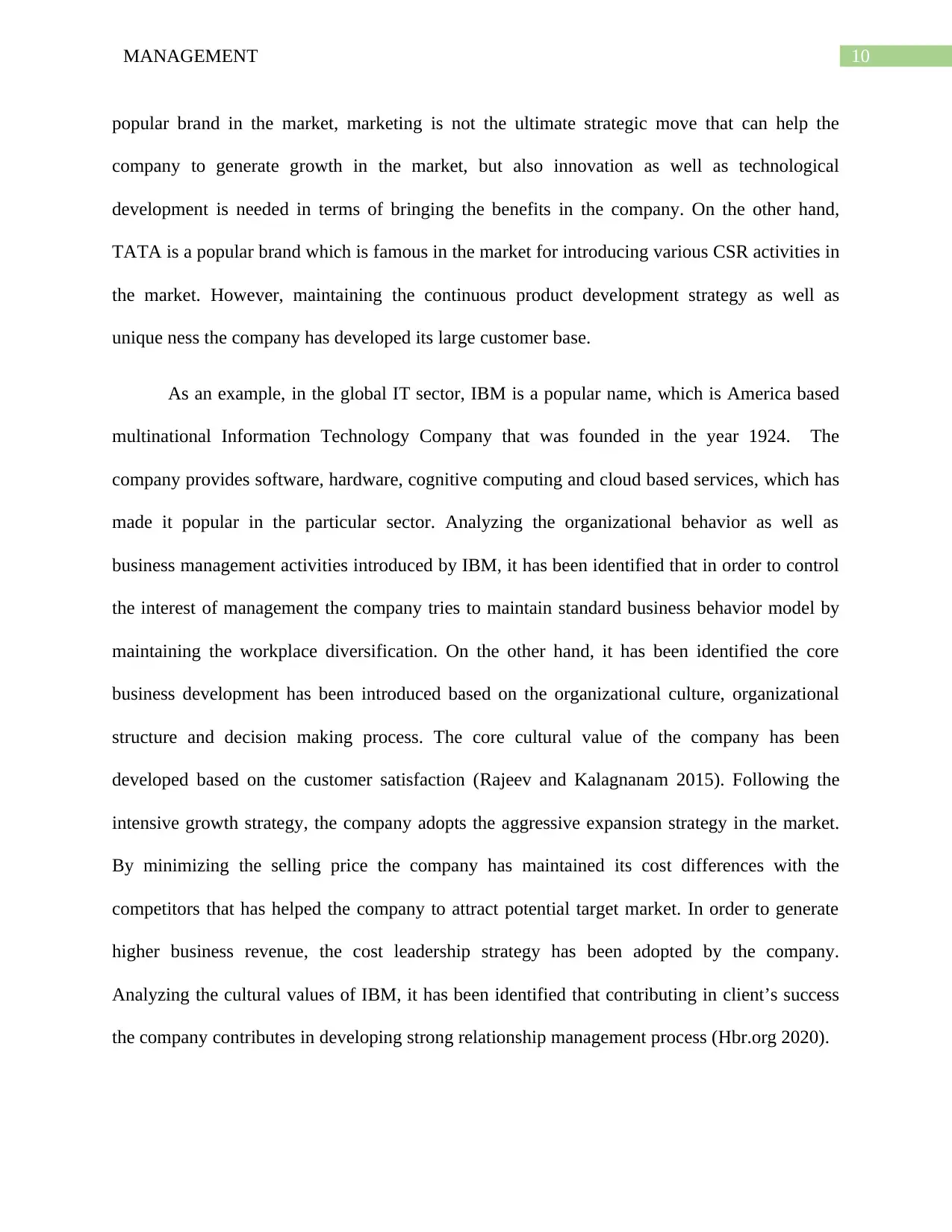
10MANAGEMENT
popular brand in the market, marketing is not the ultimate strategic move that can help the
company to generate growth in the market, but also innovation as well as technological
development is needed in terms of bringing the benefits in the company. On the other hand,
TATA is a popular brand which is famous in the market for introducing various CSR activities in
the market. However, maintaining the continuous product development strategy as well as
unique ness the company has developed its large customer base.
As an example, in the global IT sector, IBM is a popular name, which is America based
multinational Information Technology Company that was founded in the year 1924. The
company provides software, hardware, cognitive computing and cloud based services, which has
made it popular in the particular sector. Analyzing the organizational behavior as well as
business management activities introduced by IBM, it has been identified that in order to control
the interest of management the company tries to maintain standard business behavior model by
maintaining the workplace diversification. On the other hand, it has been identified the core
business development has been introduced based on the organizational culture, organizational
structure and decision making process. The core cultural value of the company has been
developed based on the customer satisfaction (Rajeev and Kalagnanam 2015). Following the
intensive growth strategy, the company adopts the aggressive expansion strategy in the market.
By minimizing the selling price the company has maintained its cost differences with the
competitors that has helped the company to attract potential target market. In order to generate
higher business revenue, the cost leadership strategy has been adopted by the company.
Analyzing the cultural values of IBM, it has been identified that contributing in client’s success
the company contributes in developing strong relationship management process (Hbr.org 2020).
popular brand in the market, marketing is not the ultimate strategic move that can help the
company to generate growth in the market, but also innovation as well as technological
development is needed in terms of bringing the benefits in the company. On the other hand,
TATA is a popular brand which is famous in the market for introducing various CSR activities in
the market. However, maintaining the continuous product development strategy as well as
unique ness the company has developed its large customer base.
As an example, in the global IT sector, IBM is a popular name, which is America based
multinational Information Technology Company that was founded in the year 1924. The
company provides software, hardware, cognitive computing and cloud based services, which has
made it popular in the particular sector. Analyzing the organizational behavior as well as
business management activities introduced by IBM, it has been identified that in order to control
the interest of management the company tries to maintain standard business behavior model by
maintaining the workplace diversification. On the other hand, it has been identified the core
business development has been introduced based on the organizational culture, organizational
structure and decision making process. The core cultural value of the company has been
developed based on the customer satisfaction (Rajeev and Kalagnanam 2015). Following the
intensive growth strategy, the company adopts the aggressive expansion strategy in the market.
By minimizing the selling price the company has maintained its cost differences with the
competitors that has helped the company to attract potential target market. In order to generate
higher business revenue, the cost leadership strategy has been adopted by the company.
Analyzing the cultural values of IBM, it has been identified that contributing in client’s success
the company contributes in developing strong relationship management process (Hbr.org 2020).
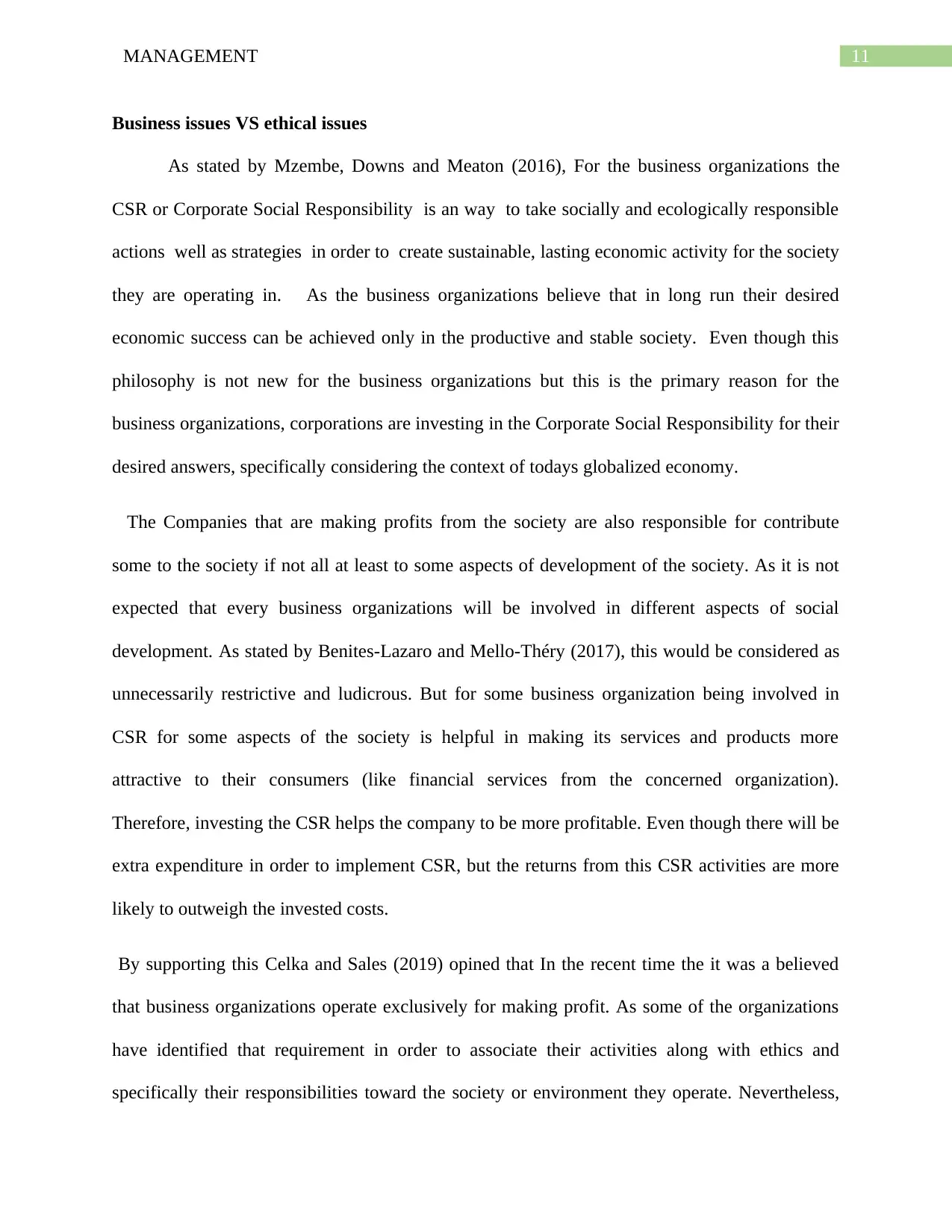
11MANAGEMENT
Business issues VS ethical issues
As stated by Mzembe, Downs and Meaton (2016), For the business organizations the
CSR or Corporate Social Responsibility is an way to take socially and ecologically responsible
actions well as strategies in order to create sustainable, lasting economic activity for the society
they are operating in. As the business organizations believe that in long run their desired
economic success can be achieved only in the productive and stable society. Even though this
philosophy is not new for the business organizations but this is the primary reason for the
business organizations, corporations are investing in the Corporate Social Responsibility for their
desired answers, specifically considering the context of todays globalized economy.
The Companies that are making profits from the society are also responsible for contribute
some to the society if not all at least to some aspects of development of the society. As it is not
expected that every business organizations will be involved in different aspects of social
development. As stated by Benites-Lazaro and Mello-Théry (2017), this would be considered as
unnecessarily restrictive and ludicrous. But for some business organization being involved in
CSR for some aspects of the society is helpful in making its services and products more
attractive to their consumers (like financial services from the concerned organization).
Therefore, investing the CSR helps the company to be more profitable. Even though there will be
extra expenditure in order to implement CSR, but the returns from this CSR activities are more
likely to outweigh the invested costs.
By supporting this Celka and Sales (2019) opined that In the recent time the it was a believed
that business organizations operate exclusively for making profit. As some of the organizations
have identified that requirement in order to associate their activities along with ethics and
specifically their responsibilities toward the society or environment they operate. Nevertheless,
Business issues VS ethical issues
As stated by Mzembe, Downs and Meaton (2016), For the business organizations the
CSR or Corporate Social Responsibility is an way to take socially and ecologically responsible
actions well as strategies in order to create sustainable, lasting economic activity for the society
they are operating in. As the business organizations believe that in long run their desired
economic success can be achieved only in the productive and stable society. Even though this
philosophy is not new for the business organizations but this is the primary reason for the
business organizations, corporations are investing in the Corporate Social Responsibility for their
desired answers, specifically considering the context of todays globalized economy.
The Companies that are making profits from the society are also responsible for contribute
some to the society if not all at least to some aspects of development of the society. As it is not
expected that every business organizations will be involved in different aspects of social
development. As stated by Benites-Lazaro and Mello-Théry (2017), this would be considered as
unnecessarily restrictive and ludicrous. But for some business organization being involved in
CSR for some aspects of the society is helpful in making its services and products more
attractive to their consumers (like financial services from the concerned organization).
Therefore, investing the CSR helps the company to be more profitable. Even though there will be
extra expenditure in order to implement CSR, but the returns from this CSR activities are more
likely to outweigh the invested costs.
By supporting this Celka and Sales (2019) opined that In the recent time the it was a believed
that business organizations operate exclusively for making profit. As some of the organizations
have identified that requirement in order to associate their activities along with ethics and
specifically their responsibilities toward the society or environment they operate. Nevertheless,
⊘ This is a preview!⊘
Do you want full access?
Subscribe today to unlock all pages.

Trusted by 1+ million students worldwide
1 out of 19
Related Documents
Your All-in-One AI-Powered Toolkit for Academic Success.
+13062052269
info@desklib.com
Available 24*7 on WhatsApp / Email
![[object Object]](/_next/static/media/star-bottom.7253800d.svg)
Unlock your academic potential
Copyright © 2020–2026 A2Z Services. All Rights Reserved. Developed and managed by ZUCOL.





